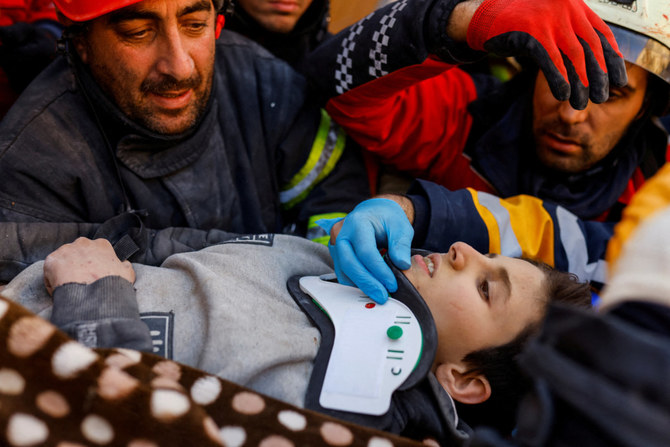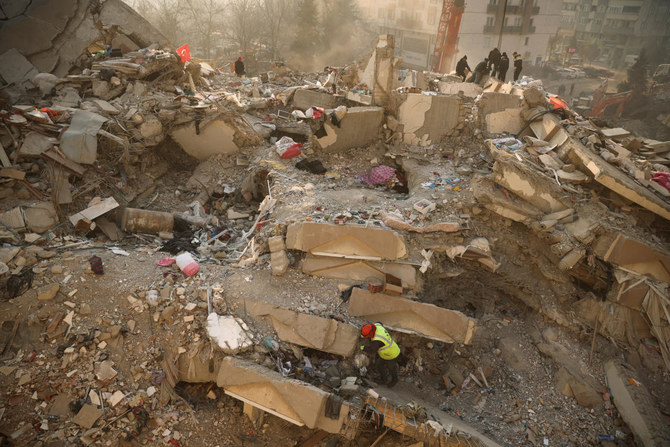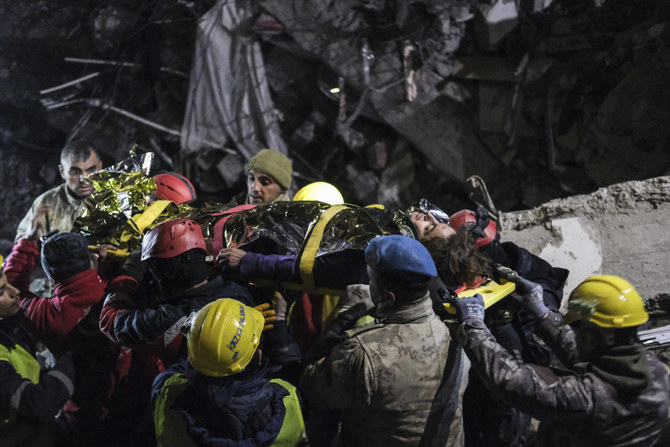KAHRAMANMARAS, Turkiye: Rescuers pulled children and the elderly from the rubble Saturday as miraculous survival stories coincided with hasty mass burials five days after an earthquake devastated parts of Turkiye and Syria, leaving over 28,000 dead.
Tens of thousands of local and international rescue workers are still scouring through flattened neighborhoods despite freezing weather that has compounded the misery of millions now in desperate need of aid.
However, amid the destruction and death, survivors continue to emerge.
“Is the world there?” asked 70-year-old Menekse Tabak as she was pulled out from the rubble in the southern city of Kahramanmaras — the epicenter of Monday’s 7.8-magnitude tremor — to applause and cries praising God, according to a video shared on state broadcaster TRT Haber.
In southern Hatay, a two-year-old girl was found alive 123 hours after the quake, reported the Hurriyet daily online, adding to numerous children saved long after the disaster, and a pregnant woman who was found on Friday.
Ibrahim Zakaria lost track of time drifting into and out of consciousness while trapped for nearly five days in the rubble of his home. The 23-year-old cellphone shop worker from the Syrian town of Jableh survived on dirty drips of water and eventually lost hope that he’d be saved.
“I said I am dead and it will be impossible for me to live again,” Zakaria, who was rescued Friday night, told The Associated Press on Saturday from his bed at a hospital in the coastal city of Latakia where his 60-year-old mother, Duha Nurallah, was also recovering.
Five days after two powerful earthquakes hours apart caused thousands of buildings to collapse, killing more than 28,000 people and leaving millions homeless, rescuers were still pulling unlikely survivors from the ruins — one of them just 7 months old.
Although each rescue elicited hugs and shouts of “Allahu akbar!” — “God is great!” — from the weary men and women working tirelessly in the freezing temperatures to save lives, they were the exception in a region blanketed by grief, desperation and mounting frustration.
More than a dozen survivors were rescued Saturday, including a family in Kahramanmaras, the Turkish city closest to the epicenter of Monday’s quake. Crews there helped 12-year-old Nehir Naz Narli to safety before going back for her parents.
In Gaziantep province, which borders Syria, a family of five was rescued from a demolished building in the city of Nurdagi, and a man and his 3-year-old daughter were pulled from debris in the town of Islahiye, television network HaberTurk reported. A 7-year-old girl was also rescued in Hatay province.
In Elbistan, a district in Kahramanmaras province, 20-year-old Melisa Ulku and another person were saved from the rubble 132 hours after the quake struck. Before she was brought to safety, police asked onlookers not to cheer or clap so as not to interfere with nearby rescue efforts.
Turkish TV station NTV reported that a 44-year-old man in Iskenderun, in Hatay province, was rescued 138 hours into his ordeal. Crying rescuers called it a miracle, with one saying they weren’t expecting to find anyone alive but as they were digging, they saw his eyes and he said his name. In the same province, NTV also reported that a baby boy named Hamza was found alive in Antakya 140 hours after the quake. Some details of his rescue, including how he survived so long, weren’t immediately clear.
Not every attempt ended happily. Zeynep Kahraman, who was brought out of the rubble after a spectacular rescue that took 50 hours, died at a hospital overnight. The ISAR German team who rescued her were shocked and saddened.
“It is important that the family could say goodbye, that they could see each other one more time, that they could hug each other again,” a member of the rescue team told German TV news channel n-tv.
The rescues came amid growing frustration over the Turkish government’s response to the earthquake, which has killed 24,617 people and injured at least 80,000 people in Turkiye alone.
Turkish President Recep Tayyip Erdogan acknowledged earlier in the week that the initial response was hampered by the extensive damage to roads and other infrastructure that made it difficult to reach some points. He also said the worst-affected area was 500 kilometers (310 miles) in diameter and was home to 13.5 million people in Turkiye.
That has meant rescue crews have had to pick and choose how and where to help.
During a tour of quake-damaged cities Saturday, Erdogan said a disaster of this scope was rare and again referred to it as the “disaster of the century.”
In Antakya, the capital of Hatay province, scattered rescue crews were still hard at work but many residents had left by Saturday. Among those who stayed were people with family still buried. Many of them had been camping in the streets for days and sleeping in cars.
Acting on a tip, a rescue team from Hong Kong found three survivors under a building near the city’s center on Saturday, said Gallant Wong, the group’s spokesperson.
But Bulent Cifcifli, a local man, said he has been waiting for days for crews to pull his mother’s body from her collapsed home. He said rescuers were working to retrieve her body at one point, but they were called to another location because they suspected there were survivors.
“Six days later, we don’t know how many are still under the rubble, and how many are dead or alive,” Cifcifli said, blaming a lack of heavy equipment.
Yazi Al-Ali, a Syrian refugee who came to Antakya from Reyhanli, has been living in a tent as she waits for crews to find her mother, two sisters, including one who was pregnant, and their families. At one point, she stood over the rubble of the home in Antakya’s old city center where she believes her pregnant sister was buried and, in a cracking voice, shouted her sister’s name, “Rajha!”
“No one is answering to us, and no one comes to look,” she said. “They have stopped us from looking ourselves. I don’t know why.”
Obstacles
But the challenges facing aid efforts were of little comfort to those waiting for help.
The disaster compounded suffering in a region beset by Syria’s 12-year civil war, which has displaced millions of people within the country and left them dependent on aid. The fighting sent millions more to seek refuge in Turkiye.
The conflict has isolated many areas of Syria and complicated efforts to get aid in. The United Nations said the first earthquake-related aid convoy crossed from Turkiye into northwestern Syria on Friday, the day after an aid shipment planned before the disaster arrived. The UN refugee agency estimated that as many as 5.3 million people have been left homeless in Syria alone.
The death toll in Syria’s northwestern rebel-held region has reached 2,166, according to the rescue worker group the White Helmets. The overall death toll in Syria stood at 3,553 on Saturday, though the 1,387 deaths reported for government-held parts of the country hadn’t been updated in days.
Turkiye’s disaster agency on Saturday said nearly 32,000 people from Turkish groups are working on search and rescue efforts. In addition, there are 8,294 international rescuers.
However, 82 Austrian soldiers on Saturday suspended rescue operations in Hatay over a “worsening security situation,” an army spokesman told AFP.
“There have been clashes between groups,” he said, without giving details.
The UN rights office had on Friday urged all actors in the affected area — where Kurdish militants and Syrian rebels operate — to allow humanitarian access.
The outlawed Kurdistan Workers’ Party, which is considered a terrorist group by Ankara and its Western allies, announced a temporary halt in fighting to ease recovery work.
In rebel-held northwestern Syria, about four million people rely on humanitarian relief, but there have been no aid deliveries from government-controlled areas in three weeks.
The Syrian government said it had approved the delivery of humanitarian assistance to quake-hit areas outside its control.
Only two aid convoys have crossed the border this week from Turkiye, where authorities are engaged in an even bigger quake relief operation of their own.
A decade of civil war and Syrian-Russian aerial bombardment had already destroyed hospitals and created electricity and water shortages.
UN Secretary-General Antonio Guterres urged the Security Council to authorize the opening of new cross-border humanitarian aid points between Turkiye and Syria. The council will meet to discuss Syria, possibly early next week.
Turkiye said it was working on opening two new routes into rebel-held parts of Syria.
The winter freeze has left thousands of people either spending nights in their cars or huddling around makeshift fires that have become ubiquitous across the quake-hit region.
Five days of grief and anguish have been slowly building into rage at the poor quality of buildings as well as the Turkish government’s response to the country’s worst disaster in nearly a century.
Odds waning for still missing victims
Even though experts say trapped people can live for a week or more, the odds of finding additional survivors are quickly waning. Rescuers were shifting to thermal cameras to help identify life amid the rubble, a sign that any remaining survivors could be too weak to call for help.
As aid continued to arrive Saturday, a 99-member group from the Indian Army’s medical assistance team began treating the injured in a temporary field hospital in the southern city of Iskenderun, where a main hospital was demolished.
One man, Sukru Canbulat, was wheeled into the hospital, his left leg badly injured with deep bruising, contusions and lacerations.
Wincing in pain, he said he was rescued from his collapsed apartment building in nearby Antakya within hours of the quake. But after receiving basic first aid, he was released without getting proper treatment.
“I buried (everyone that I lost), then I came here,” Canbulat said, counting his dead relatives. “My daughter is dead, my sibling died, my aunt and her daughter died, and the wife of her son” who was 8½ months pregnant.
A large makeshift graveyard was under construction in Antakya’s outskirts on Saturday. Backhoes and bulldozers dug pits in the field as trucks and ambulances loaded with black body bags arrived continuously. Soldiers directing traffic on the busy adjacent road warned motorists not to take photos.
The hundreds of graves, spaced no more than 3 feet (a meter) apart, were marked with simple wooden planks set vertically in the ground.
A worker with Turkiye’s Ministry of Religious Affairs who didn’t wish to be identified because of orders not to share information with the media said that around 800 bodies were brought to the cemetery Friday, its first day of operation. By midday Saturday, he said, as many as 2,000 had been buried.
Over 12,000 buildings destroyed
Officials in the country say 12,141 buildings were either destroyed or seriously damaged in the earthquake.
“Damage was to be expected, but not the type of damage that you are seeing now,” said Mustafa Erdik, a professor at Istanbul-based Bogazici University.
Police on Friday detained a contractor trying to flee the country after his building collapsed in the catastrophic quake.
Authorities in Kahramanmaras and Osmaniye have launched investigations into the buildings that have collapsed, according to the Anadolu state news agency.
The tremor was the most powerful and deadliest since 33,000 people died in a 7.8-magnitude tremor in 1939.






























